The Parliamentary System: Legislature and Executive NCERT Solutions | Social Science Class 8 - New NCERT PDF Download
| Table of contents |

|
| Page No. 139 |

|
| Page No. 145 |

|
| Page No. 148 |

|
| Page No. 150 |

|
| Page No. 151 |

|
| Page No. 152 |

|
| Page No. 154 |

|
| Page No. 155 |

|
| Page No. 157 |

|
| Page No. 158 |

|
| Page No. 159 |

|
| Page No. 160 |

|
| Page No. 161 |

|
Page No. 139
The Big Questions
Q1: What is India’s parliamentary system, and how is it structured?
Ans: India’s parliamentary system is a form of government where the executive (government) is drawn from the legislature and remains accountable to it. In this system, the people elect their representatives to the Lok Sabha, and the majority forms the government.
Structure of India’s Parliamentary System:
- At the Union level, the Parliament consists of the President, Lok Sabha (House of the People), and Rajya Sabha (Council of States). This is a bicameral system.
- The Prime Minister leads the government and is supported by the Council of Ministers, who are accountable to the Lok Sabha.
- At the State level, each state has its own legislature and executive, called its State Assembly. Some states have two houses — the Vidhan Sabha and Vidhan Parishad.
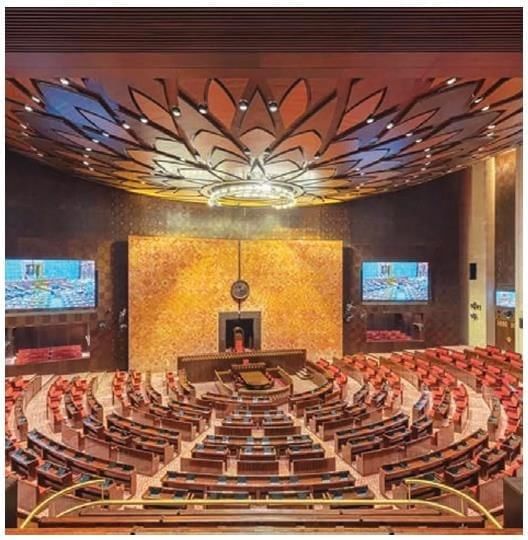 A view of the Chamber of the Rajya Sabha taken from the Press Gallery
A view of the Chamber of the Rajya Sabha taken from the Press Gallery
Q2: What are the key functions of the Parliament?
Ans: The Parliament performs several important functions:
1. Constitutional Function:
It protects the values of the Constitution, ensures democracy and federalism, and makes laws to uphold Fundamental Rights and Directive Principles.
2. Legislative Function:
It makes new laws, changes old ones, and removes outdated laws.
3. Financial Function:
It passes the Budget and checks how the government spends public money.
4. Executive Control:
It keeps a watch on the government’s work through questions, debates, and discussions.
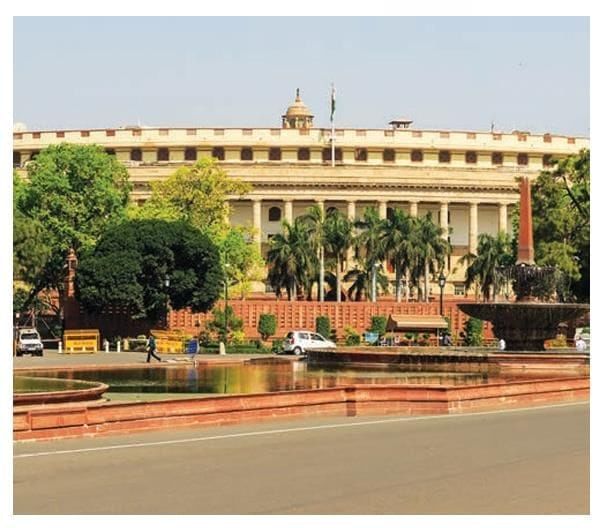 Our old Parliament (now called Samvidhan Sadan)
Our old Parliament (now called Samvidhan Sadan)
Q3: What are the roles of the legislature and the executive in India’s Parliamentary democracy?
Ans: In India’s Parliamentary democracy, the Legislature and the Executive perform different but related functions. The Legislature makes new laws, amends old ones, and ensures the Executive follows the Constitution. It also represents the people’s voice and checks the government’s work through debates, Question Hour, and the Budget. The Executive, led by the Prime Minister and the Council of Ministers, is responsible for implementing laws and running the daily administration of the country. It remains answerable to the Lok Sabha for all its actions and decisions.
Q4: How are the legislature and the executive organised at the union and state levels?
Ans: India has a federal system, where both the Union and the States have their own legislature and executive. At the Union level, the legislature is bicameral, consisting of the Lok Sabha and the Rajya Sabha, along with the President. The Executive includes the President as the Head of State, and the Prime Minister with the Council of Ministers who run the government. At the State level, the legislature may be unicameral or bicameral, and the Executive includes the Governor, Chief Minister, and the Council of Ministers.
Page No. 145
Q1: (a) From your previous LET’S lessons on the theme of Democracy and Governance, name a few Constitutional functions of the Parliament. Did you list the election of President and Vice President?
Ans: The Parliament has important constitutional functions like electing the President and Vice President, making and changing laws and holding the government accountable. Yes, I did list the election of the President and Vice President as key functions, as these elections play an important role in how the Parliament works in our democracy.
(b) What about amendments to the Constitution?
Ans: The Parliament has the power to make amendments to the Constitution. This means it can change or update parts of the Constitution to meet the needs of the country. Amendments help keep the Constitution relevant and strong as India grows and changes.
Page No. 148
Let's Explore
Q1: Draw a small chart to show the process of how RTE became an act. What do you think the process would be if RTE had been tabled in the Lok Sabha?
Ans: The Right to Education (RTE) Act became law through a step-by-step process in Parliament. Below is a chart showing how it became an Act.
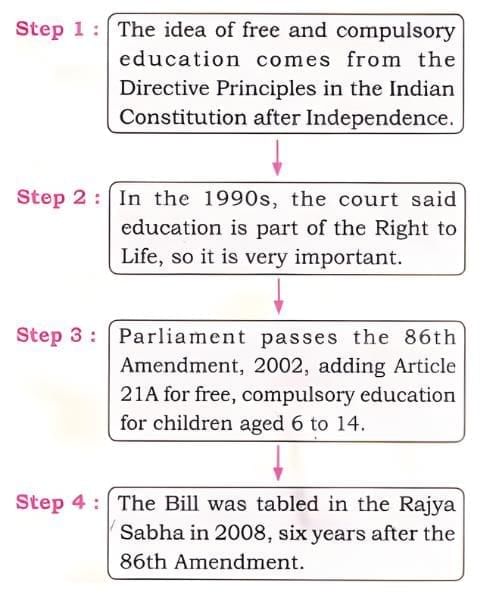
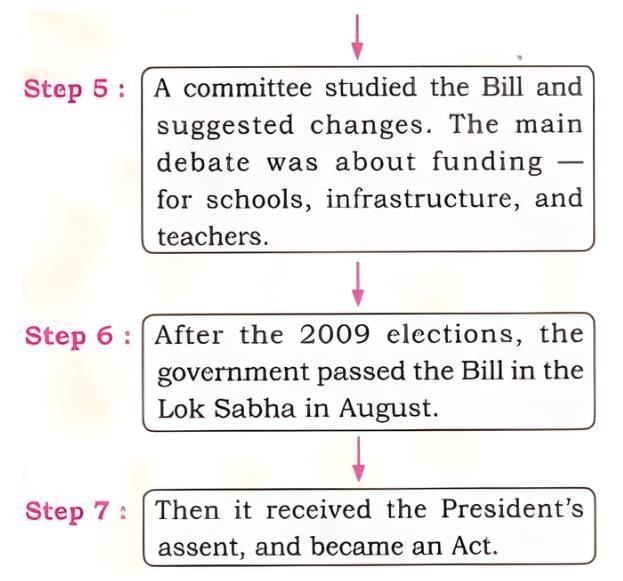 If it had been introduced in the Lok Sabha first:
If it had been introduced in the Lok Sabha first: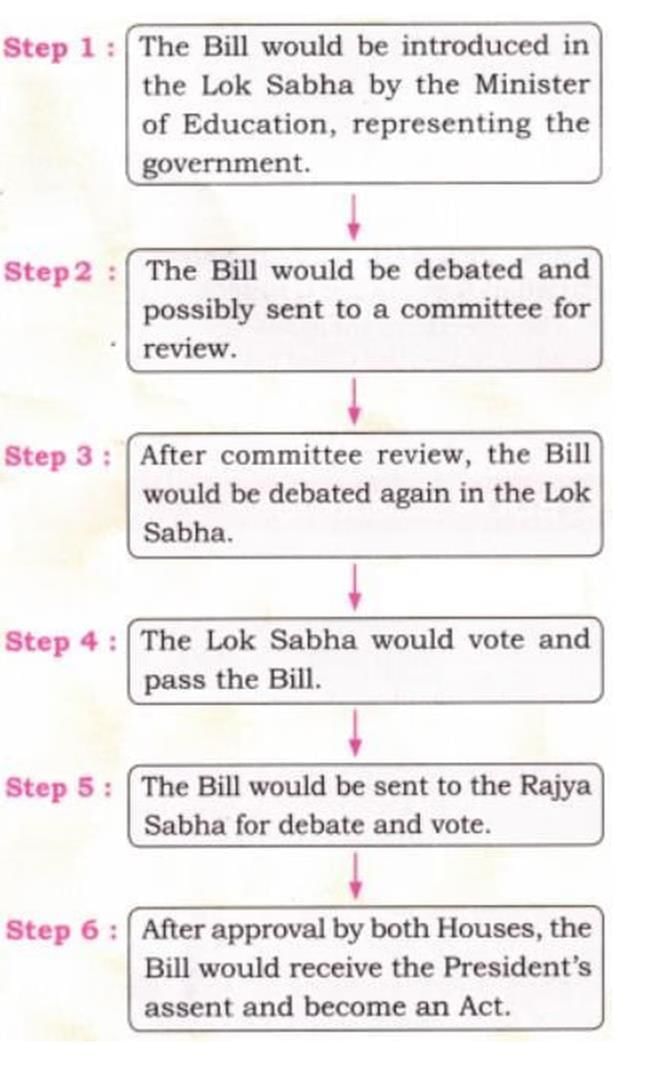
Page No. 150
Let's Explore
Q1: Given here is an extract from the report of meetings between the Standing Committee on Health and Family Welfare and the officers from the Ministry of Health and Family Welfare. Observe the screenshots above and discuss the following in small groups –
(a) Who is reporting to whom?
Ans: The Ministry of Health and Family Welfare reports to the Parliamentary Standing Committee on Health and Family Welfare, which reviews its work and gives recommendations.
(b) What is the subject that has been reviewed?
Ans: The Committee reviewed the co-location of AYUSH facilities at PHCs, CHCs, and District Hospitals and the need for separate Departments of AYUSH in all States and Union Territories.
(c) Identify the Committee’s recommendation.
Ans: It recommended that States and UTs without a Department of AYUSH should create one for better coordination and faster implementation of AYUSH schemes.
(d) What is the government’s reply?
Ans: The Government replied that health is a state subject, but 24 States and UTs have already set up separate AYUSH Directorates.
Page No. 151
Let's Explore
Q1: Why do you think that Parliament keeps an eye on government expenditure? (Hint: Whose money does the government spend?)
Ans: Parliament keeps an eye on government spending because it is public money collected through taxes. It ensures that this money is used properly for people’s welfare — like schools, hospitals, and roads — and not wasted or misused. Through debates and questions, Parliament checks how and where money is spent, making the government accountable to the people and preventing corruption or misuse of funds.
Don't Miss Out
Q1: Part V of the Indian Constitution begins with Chapter I – The Executive. It looks at the roles and responsibilities of the President, Vice President, and Council of Ministers, among others. It is in Chapter II that the role and functions of Parliament are listed. Why might this be so?
Ans: The Constitution starts with the executive because it shows how important the executive is in running the country. While the parliament makes the laws, the executive like the president, prime minister, and council of ministers puts those laws into action. This order helps us understand that both law-making and law-implementation are important. The government works properly only when both the parliament and the executive do their jobs together.
Page No. 152
Let's Explore
Q1: If the Executive is part of the Legislature, how do we say that there is separation of power? (Hint: revisit the section on legislature above)
Ans: In India’s parliamentary system, the Executive (Prime Minister and Council of Ministers) comes from the Legislature (Parliament), but both have separate roles. The Legislature makes laws, the Executive implements them, and the Judiciary ensures they follow the Constitution. Through tools like Question Hour and the Budget, Parliament checks the Executive’s actions. This system of checks and balances maintains separation of power and prevents any branch from becoming too powerful.
Page No. 154
Q1: (a) What might happen if one of the organs Legislature, Executive, Judiciary had all the power?
Ans: If one of the organs had all the power, it would go against the spirit of the Constitution and affect people’s rights and freedoms.
(b) How could it affect the rights of people?
Ans:
- If the Legislature had all the power, it could make unfair laws.
- If the Executive ruled alone, decisions might favour one party.
- If the Judiciary controlled everything, elected leaders would lose authority.
In all cases, people’s freedoms would be at risk.
(c) Discuss with your classmates how each organ checks the others. For example, how does the Legislature question the actions of the Executive?
Ans: The Legislature keeps the Executive in check through Question Hour, debates, and no-confidence motions, and by approving all government spending.
(d) How does the Judiciary make sure that laws and government actions respect the Constitution?
Ans: The Judiciary checks that laws and actions follow the Constitution. It can strike down any law that violates people’s rights.
(e) Do you think there might be ways in which the actions of the Judiciary itself are reviewed?
Ans: Yes, the actions of the Judiciary can be reviewed. Though it is independent, if it goes beyond its powers, it can be checked by other branches. In cases of misconduct or corruption, judges can be impeached by Parliament. This ensures that the Judiciary remains fair, accountable, and within its limits.
Page No. 155
Q2: (a) Can you find examples where the Judiciary has asked lawmakers to review a law?
Ans: The Judiciary often points out issues with laws and suggests changes. Some examples include:
- Motor Vehicles Act, 1988: In 2024, the Supreme Court gave a clear interpretation regarding the type of driving license needed for transport vehicles under the Light Motor Vehicle (LMV) category and asked the Government to amend the law to remove any confusion.
- Uniform Civil Code (UCC): The Supreme Court stressed the need for a Uniform Civil Code, arguing that one common set of laws for all religions would promote equality and prevent discrimination.
- National Judicial Appointments Commission (NJAC) (2015): The Supreme Court struck down the NJAC Act, questioning its implementation and suggesting a review of the judicial appointment process.
- Right to Privacy (2017): The Supreme Court ruled that privacy is a fundamental right and asked lawmakers to review laws like the Aadhaar Act for privacy concerns.
(b) Can you find any instances when the implementation of a law has been questioned by the Judiciary?
Ans: Yes, the Judiciary has questioned the government several times for not properly implementing laws.
- In 2013, the Supreme Court directed the government to ensure the Right to Information (RTI) Act was implemented effectively as many departments caused delays.
- In 2016, it asked the government to ensure timely wage payments under MNREGA for rural workers.
- In 2005, the Court ordered strict steps to reduce pollution in the Ganga and Yamuna rivers by enforcing environmental laws.
- In 1997, it stopped deforestation and directed the proper implementation of the Forest Conservation Act.
Page No. 157
Let's Explore
Q1: What type of legislature does your state have?
Ans: (Suggestive Answer) I live in West Bengal, and it has a unicameral legislature. That means it has only one house, called the Vidhan Sabha or Legislative Assembly.
Page No. 158
Q1: Study the data given in the following table. What conclusions can you draw about the functioning of Parliament over time? Compile data for more recent years.
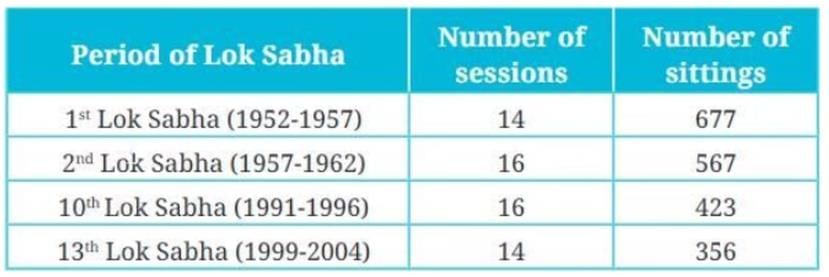
Ans: The data shows a steady decline in the number of Lok Sabha sittings over time. While the number of sessions has remained fairly consistent, the 1st Lok Sabha had 677 sittings, which dropped to 567 in the 2nd, 423 in the 10th, and just 356 in the 13th. This suggests that Parliament now spends less time on debates and discussions than in earlier years, which may affect the quality of legislative work.

Q2: Read the following statement of the former chairman of the Rajya Sabha, M. Venkaiah Naidu given in 2021: “…the productivity of Rajya Sabha during 200414 has been about 78% and it declined to about 65% since then. Of the 11 sessions [that he presided over], four of them clocked low productivity of 6.80%, 27.30%, 28.90% and 29.55%; during the year 2018, the Rajya Sabha recorded the lowest ever productivity of35.75% under the impact of disruptions.”
(a) What conclusions can you draw from this statement?
Ans: The statement by M. Venkaiah Naidu shows that the productivity of the Rajya Sabha has declined over time. Between 2004–2014, it worked efficiently with about 78% productivity, but later it fell to around 65%, and some sessions were even below 30%. In 2018, productivity reached its lowest at 35.75% due to frequent disruptions. This shows that the Rajya Sabha is often unable to discuss and pass laws properly, which affects its effectiveness and reduces public trust in Parliament.
(b) What implications does this have for the role that the Rajya Sabha is expected to play?
Ans: The Rajya Sabha represents the states and helps maintain the federal balance in Parliament. When its productivity declines, important debates and discussions are reduced. This limits regional participation in national decision-making and may lead to laws being passed without enough review. Continuous disruptions also lower public confidence. A strong and active Rajya Sabha is important for a healthy democracy because it improves the quality of law-making and ensures accountability of the government.
Page No. 159
Q1: Take up a small group project. Compile data regarding the functioning of the legislature in your state or union territory.
Ans: I studied the West Bengal Legislative Assembly, which has a unicameral legislature with 294 elected members.
The main office bearers are the Speaker, Deputy Speaker, Chief Minister, Governor, and Leader of the Opposition.
Laws are made through steps such as bill introduction, discussion, voting, and Governor’s approval.
Recent sessions discussed education, health, welfare schemes, and economic development.
The 2023 Budget Session focused on infrastructure and labour reforms.
Information was collected from the official Assembly website, news reports, and NCERT textbooks.
Q2: Seek an appointment with an MLA and gather information about challenges with respect to the state legislature.
Ans: After speaking with an MLA, I learnt that the state legislature faces several challenges. Many members are absent during important debates, which reduces the quality of discussions. Frequent disruptions also stop the House from working smoothly. Some bills get delayed because of lack of proper debate or agreement. Sometimes, debates become too political and ignore public issues. The MLA also said that citizens should take more interest, especially young people, as their active participation can make the legislature stronger and more effective.
Page No. 160
Don't Miss Out
Q1: Atal Bihari Vajpayee, a former Prime Minister of India, said during a amar rehna chhahiye.
(Governments will come and go , parties will rise and fall. But the nation must endure, and its democracy must live on.)
(a) What message do you think this gives about the role of Parliament and leaders in a democracy?
Ans: This quote reflects the deep concern of our great former Prime Minister, Shri Atal Bihari Vajpayee. It shows his disappointment with the behaviour of some members of Parliament and offers valuable suggestions. He emphasises the importance of keeping the interest of the people and the country above personal or political gain.
(b) Why is it important to protect democratic values even when political power changes?
Ans: It is important to protect democratic values because they ensure the rights, freedoms, and voice of the people, regardless of who holds power. Governments may come and go, but democracy provides stability, accountability, and continuity for the nation. Without strong democratic values, political change could lead . to disorder or the misuse of power.
Page No. 161
Questions and Activities
Q1: Find out how many representatives from your state are in each House of the Parliament.
Ans: (Suggestive Answer) Every state in India has representatives in both Houses of Parliament. In my state, Uttar Pradesh, there are 80 members in the Lok Sabha. These members are directly elected by the people. There are also 31 members from Uttar Pradesh in the Rajya Sabha. These members are elected by the state legislators. So, Uttar Pradesh has 80 representatives in the Lok Sabha and 31 in the Rajya Sabha. This shows how important my state is in making laws and decisions for the country.
For reference, the number of representatives from other states are also given below: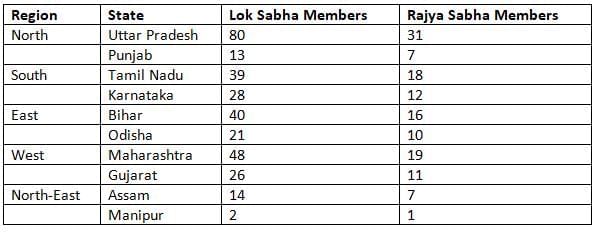
Q2: What makes the Indian Parliament the “voice of the people”? How does it ensure that different opinions are heard?
Ans: The Indian Parliament is called the “voice of the people” because it represents citizens from all parts of the country. Members of the Lok Sabha are directly elected by the people, and members of the Rajya Sabha are chosen by state legislatures. This ensures that people from different regions and communities have a say in law-making.
Parliament ensures that different opinions are heard through:
- Question Hour, where MPs ask the government about its work.
- Debates and discussions on bills and national issues.
- Parliamentary Committees, which study laws and policies in detail before they are passed.
Q3: Why do you think the Constitution made the Executive responsible to the Legislature?
Ans: The Constitution made the Executive (Prime Minister, ministers, and officials) responsible to the Legislature (Parliament) so that the government remains accountable to the people. This system prevents the misuse of power and ensures that leaders work within their limits. Ministers must explain their actions and decisions in Parliament, making the government transparent and answerable. This relationship between the Executive and the Legislature helps to protect democracy and ensures that the government always serves the people’s interests.
Q4: Why do you think we have chosen the system of bicameral legislature at the Union level?
Ans: India has a bicameral legislature to represent both the people and the states fairly. The Lok Sabha represents the citizens directly, while the Rajya Sabha represents the states and protects their interests. Since India is a large and diverse federal country, having two Houses helps balance national unity and regional interests. It also ensures that laws are discussed and reviewed carefully before being passed, making the law-making process more effective and democratic.
Q5: Try to track the journey of a recent bill passed by the Parliament. Identify in which House it was introduced. Were there any major debates or disagreements? How long did it take for the bill to become a law? Use newspaper archives, government websites, and Lok Sabha debates, or ask your teacher for help.
Ans: (Suggestive Answer) The Women’s Reservation Bill, which reserves 33% of seats for women in the Lok Sabha and State Assemblies, had a long journey. It was first introduced in 1996 but faced many delays. The Bill was reintroduced in the Lok Sabha on 19th September 2023 and passed on 21st September 2023 with 454 votes in favour. The Rajya Sabha also passed it on the same day. Finally, it received the President’s assent on 28th September 2023, becoming the Constitution (106th Amendment) Act, 2023. It took 27 years for this Bill to become a law, showing the long struggle for women’s political representation.
Q6: Choose a recent law passed by the Parliament. Divide into teams to role-play different parts of the process — MPs debating in Lok Sabha and Rajya Sabha, ministers answering questions, and the President giving assent. Present a short skit showing how a bill becomes a law; enact a ‘model Parliament’.
Ans: Model Parliament Skit: How the Women’s Reservation Bill Becomes a Law.
- Characters:
- Speaker of the Lok Sabha
- Law Minister
- Supportive MP
- Opposition MP
- President
- Scene: Lok Sabha (Lower House)
- Speaker: Honourable Members, we will now discuss the Women’s Reservation Bill, which proposes reserving 33% of seats for women for the Lok Sabha and State Assemblies.
- Law Minister: This bill will increase women’s participation in politics. I request everyone’s support.
- Supportive MP: I strongly support this bill! Women must have equal represent.
- Opposition MP: I agree, but we ensure proper implementation in all regions.
- Speaker: All in favour, say Aye!
- All MPs (except a few): Aye
- Speaker: The Bill passes in the Lok Sabha. Now, it goes to the Rajya Sabha.
- Scene: Rajya Sabha (Upper House)
- Rajya Sabha Speaker: The Women’s Reservation Bill is now being discussed.
- Supportive MP: This bill is essential for a stronger democracy!
- Opposition MP: Honourable Speaker, we support the bill, but we believe it should include more details on how women from all backgrounds will benefit, especially in rural areas.
- Speaker: All in favour, say Aye!
- Most MPs: Aye!
- Rajya Sabha Speaker: The Bill passes. We now send it for Presidential assent.
- Scene: The President’s Assent
- President: I have received the Women’s Reservation Bill and after review, I give my assent.
- President: The Women’s Reservation Bill is now a law.
Q7: The Women’s Reservation Bill, 2023, was passed with wide support. Why might it have taken over 25 years for this bill to be passed, despite being discussed for so long?
Ans: The Women’s Reservation Bill, 2023 took 25 years to pass due to several reasons:
- Parties had different views on the reservation structure. Some demanded sub-reservation for women from OBCs (Other Backward Classes) within the 33% quota, while others opposed this.
- Reserving seats for women meant many male members would lose their positions, causing resistance within political parties.
- Although no major party openly opposed the bill, there was an absence of strong political support to prioritise and pass it. It was often treated more as a symbolic promise than a serious legislative agenda.
Q8: Sometimes the Parliament is disrupted and does not function for the number of days it is supposed to. What impact do you think this has on the quality of laws and the trust people place in their representatives?
Ans: When Parliament is disrupted and does not function properly, it affects both law-making and people’s trust. Important bills are often passed without enough discussion, which can reduce the quality of laws. Continuous disruptions also make citizens lose faith in their representatives and waste valuable time and public money. When debates turn disorderly, it weakens democracy and discourages young people from taking part in politics.
In the long run, frequent disruptions slow down the country’s progress and reduce respect for democratic institutions.
Q9: Can you create ‘interest’ groups among students and list questions related to any policy that you may want to ask your MP and/or your MLA? How would these questions be different if it were the MP instead of the MLA, and vice versa?
Ans: As students, we care about policies that affect our education, future careers, and the environment. To explore these issues, I divided the class into two groups: Group A and Group B.
Group A focused on national issues and prepared questions to ask our MP (Member of Parliament):
- Education: What is the central government doing to make higher education more accessible and affordable for students across the country?
- Jobs: What steps are being taken to create better job opportunities for young people in various sectors?
- Environment: What national-level actions are being taken to reduce pollution and protect the environment?
Group B focused on local and state issues and prepared questions to ask our MLA (Member of Legislative Assembly):
- Education: What is being done to improve the quality of education in government schools and colleges in our area?
- Jobs: How is the state government helping to create more jobs for young people in our locality?
- Environment: What local steps are being taken to reduce pollution and make our surroundings more eco-friendly?
The questions we ask our MP and MLA are different because they handle different responsibilities. MPs work on national issues that affect the whole country, while MLAs focus on local and state-level problems in our area. By asking the right questions, we can make sure our leaders listen to the concerns of students like us.
Q10: What is the role that the Judiciary plays in Indian democracy? What could happen if we didn’t have an independent judiciary?
Ans: The Judiciary plays a vital role in protecting democracy and citizens’ rights. It ensures that all laws and government actions follow the Constitution. Through judicial review, it can cancel any law or action that violates constitutional principles. It also settles disputes between the government and citizens or between different levels of government. If there were no independent judiciary, the government could pass unfair laws, people’s rights would be at risk, and justice might become biased, weakening trust in democracy.
|
31 videos|128 docs|7 tests
|
FAQs on The Parliamentary System: Legislature and Executive NCERT Solutions - Social Science Class 8 - New NCERT
| 1. What is the role of the legislature in the parliamentary system? |  |
| 2. How does the executive branch function within the parliamentary system? |  |
| 3. What are the key differences between the parliamentary system and the presidential system? |  |
| 4. What is the significance of the Prime Minister's role in the parliamentary system? |  |
| 5. How does the concept of 'no-confidence' work in a parliamentary system? |  |




















